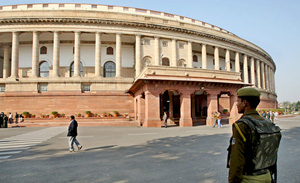New Delhi, May 7: Settling the country's 41-year-old border issue with Bangladesh, Parliament today unanimously passed a historic bill to operationalise the Land Boundary Agreement that provides for exchange of territories.
The Lower House, showing rare unanimity, passed the Constitution (119th Amendment) Bill to allow the operationalisation of the 1974 India-Bangladesh Land Boundary agreement.
All the 331 members present in the House voted for the bill which became the 100th Constitutional amendment passed by Parliament.
Soon after the passage, Prime Minister Narendra Modi walked up to the Opposition benches to thank leaders including Congress chief Sonia Gandhi and Mallikarjun Kharge, BJD's B Mahtab, TMC's Sudip Bandopadhyay and AIADMK leader P Venugopal.
Earlier, External Affairs Minister Sushma Swaraj said it was beneficial for both the countries and that there will a "notional" loss of territory without borders getting contracted.
India will get 510 acres while Bangladesh will get 10,000 acres. "But these are notional figures as these areas are deep inside territories of the two countries. Our borders are not getting contracted," she said, while responding to members' questions whether India will lose some territory.
Swaraj said the measure, apart from demarcating the boundaries, would also help checking illegal immigration.
"A solution to the problem of illegal immigration is inherent in this legislation. With the land border now being decided (with the passage of the bill), the portions where there is no fencing will also get fenced," she said.
Swaraj said the only issue which remained to be settled with Bangladesh was that of river water-sharing, primarily relating to Teesta river. "The way in which we are now settling the land boundary issue, we will try to settle this issue also."
The maritime boundary between India and Bangladesh has also been settled last year with the award by the international tribunal.
Refuting allegations about India's alleged 'big brotherly' attitude, the External Affairs Minister said "one is 'big brother' which symbolises arrogance. But there is also the 'elder brother' who is caring. Ours is a caring attitude. India will maintain the attitude of the 'elder brother' with our neighbours."
She also announced a package of Rs 3,008 crore to West Bengal for rehabilitation Indian nationals who will come from Bangladesh, with their numbers estimated to go up to 30,000.
Of this amount, Rs 775 crore is for expenses on fixed infrastructure and the remaining amount would be for variable expenses, depending upon how many people are to be rehabilitated by the state government.
Swaraj, in her speech, also referred to the Indira Gandhi-Mujibur Rahman Land Boundary Agreement of 1974 and the historic protocol signed between former Prime Minister Manmohan Singh and Bangladesh President Sheikh Hasina in September 2011 paving the way for elimination of Bangladeshi and Indian territorial enclaves.
Observing that she has been "transparent" in stating that her party BJP was earlier opposed to the bill, the Minister said it was primarily because of concerns that Assam's interests would be adveresely affected.
However, she said Assam Chief Minister Tarun Gogoi, who had earlier expressed some reservations on similar lines, wrote to the Prime Minister and her, urging the Centre to include the clauses relating to the state.





Comments
Add new comment